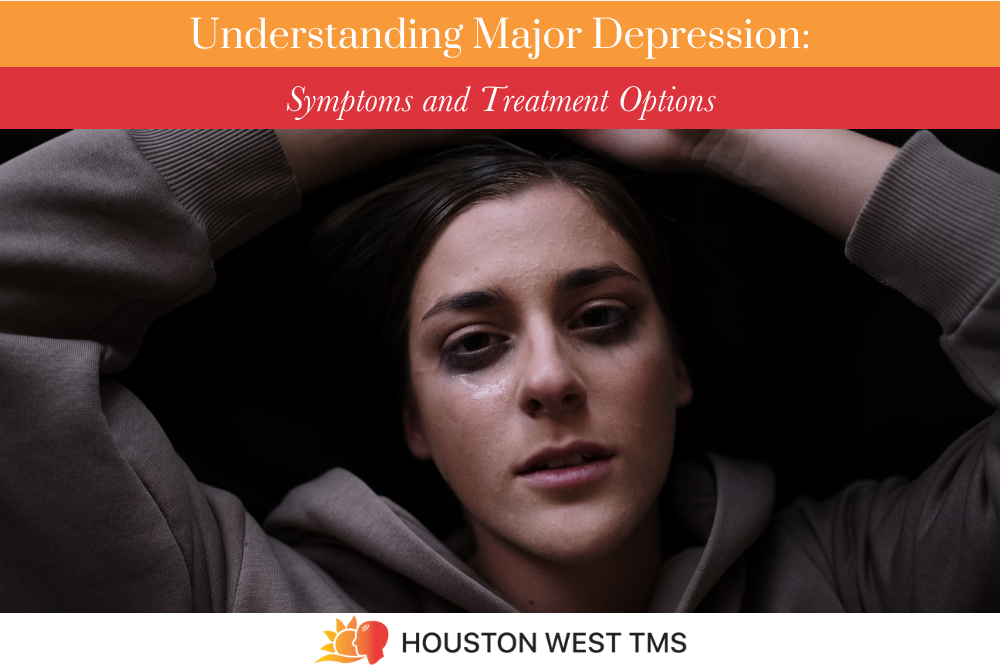 Presented by Houston West TMS
Presented by Houston West TMS
902 Frostwood Dr. Suite 283
Houston, TX 77024
📞 (713) 464-4455
Major depression, also known as major depressive disorder (MDD), is more than just feeling sad or having a rough day. It’s a serious mental health condition that affects how a person thinks, feels, and handles daily activities. At Houston West TMS, we understand the weight of depression and are committed to helping individuals find effective, long-term relief through evidence-based treatment options—including Transcranial Magnetic Stimulation (TMS).
In this blog, we’ll break down the symptoms of major depression, explore potential causes, and review available treatment options, including traditional therapies and innovative solutions like TMS.
What Is Major Depression?
Major depression is a mood disorder characterized by persistent feelings of sadness, hopelessness, and a lack of interest or pleasure in activities. It’s one of the most common mental health disorders in the United States, affecting more than 17 million adults each year.
This condition is not a sign of weakness or something someone can simply “snap out of.” It is a complex medical illness involving changes in brain function, chemistry, and structure—often requiring comprehensive treatment and ongoing support.
Common Symptoms of Major Depression
Symptoms of major depression vary from person to person, but commonly include:
- Persistent sadness, anxiety, or emptiness
- Loss of interest or pleasure in hobbies and activities
- Fatigue or lack of energy
- Changes in appetite or weight
- Sleep disturbances (insomnia or oversleeping)
- Difficulty concentrating, remembering, or making decisions
- Feelings of worthlessness, guilt, or helplessness
- Physical symptoms like headaches or digestive issues
- Thoughts of death or suicide
For a diagnosis, symptoms must last for at least two weeks and interfere with a person’s ability to function in daily life.
What Causes Major Depression?
While the exact cause of depression isn’t fully understood, several factors can contribute to its development:
- Biological differences: People with depression often have physical changes in their brains.
- Brain chemistry: Imbalances in neurotransmitters may play a role.
- Genetics: A family history of depression can increase risk.
- Life events: Trauma, abuse, or significant loss can trigger depression.
- Medical conditions: Chronic illness, substance use disorders, and certain medications can be linked to depression.
Understanding the underlying cause can help guide the most effective treatment plan.
Treatment Options for Major Depression
1. Psychotherapy (Talk Therapy)
Cognitive Behavioral Therapy (CBT), Interpersonal Therapy (IPT), and other forms of psychotherapy help patients identify and change negative thought patterns and develop healthier coping skills.
2. Medication
Antidepressants such as SSRIs (Selective Serotonin Reuptake Inhibitors) or SNRIs (Serotonin-Norepinephrine Reuptake Inhibitors) are commonly prescribed. While effective for many, some individuals may not respond or may experience unwanted side effects.
3. Lifestyle Modifications
Exercise, nutrition, quality sleep, mindfulness, and social support can significantly improve mood and enhance traditional treatment outcomes.
4. Transcranial Magnetic Stimulation (TMS)
At Houston West TMS, we offer FDA-approved TMS therapy for individuals with treatment-resistant depression. TMS is a non-invasive procedure that uses magnetic fields to stimulate nerve cells in the brain. It targets the areas associated with mood control, helping to restore normal function without the side effects of medications.
TMS is:
- Drug-free and non-sedating
- Performed on an outpatient basis
- Typically requires no downtime
- Well-tolerated with minimal side effects
Q&A: Understanding Major Depression and Your Options
Q: How do I know if I have major depression?
A: If you’ve experienced persistent sadness, fatigue, or a loss of interest in things you once enjoyed for more than two weeks, it may be a sign of major depression. We recommend speaking with a qualified mental health provider for a full assessment.
Q: What if medications haven’t worked for me?
A: You’re not alone. Nearly 1 in 3 people with depression don’t respond adequately to antidepressants. TMS therapy offers a drug-free alternative that can help patients find relief after other treatments have failed.
Q: Is TMS therapy safe?
A: Yes, TMS is FDA-approved and has been shown to be both safe and effective. Side effects are usually mild and may include temporary discomfort at the treatment site or slight headaches.
Q: How long does TMS take to work?
A: Most patients begin noticing improvement after 2–3 weeks of daily sessions. A typical course of treatment lasts about 6–8 weeks.
Q: Do I need a referral to start TMS therapy?
A: Not necessarily. Contact Houston West TMS directly, and we can help you determine if you’re a candidate and guide you through the process.
Take the First Step Toward Healing
If you or a loved one is struggling with major depression, don’t wait to seek help. You deserve to feel better—and you don’t have to face it alone.
Contact Houston West TMS Today:
📍 Address: 902 Frostwood Dr. Suite 283, Houston, TX 77024
📞 Phone: (713) 464-4455
🌐 Website: Visit us online (include if available)
Houston West TMS is proud to be at the forefront of mental health care in Houston. Let us help you rediscover hope, one session at a time.
